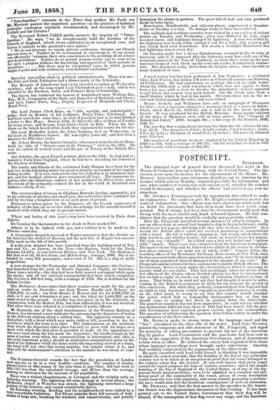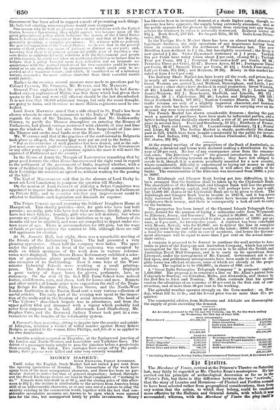POSTSCRIPT.
SATURDAY.
The principal topic of general interest discussed last night in the House of Commons was our relations with the United States. The dis- cussion arose upon the motion for the adjournment of the House. Mr. BRIGIIT, desirous that some statements should go out to America by the steamer which sails on Monday, inquired generally for information, and also what number of vessels was sent out last year, whether the number would be increased, and whether the officers had received any new in- structions.
Mr. SEYMOUR FITZGERALD took the opportunity thus offered to make an explanation. He could not give Mr. Bright a satisfactory answer for want of information. Our officers may have shown too much zeal, but no doubt the statements that have been made have been much exag- gerated. But if wrong had been done the Government would meet that wrong with the most candid and frank acknowledgment. He had con- fidence that the question would be cordially and peacefully settled.
Here Mr. Fitzgerald described several instances of alleged outrages. In one an officer from an armed boat boarded a ship in Sagua la Grande, civilly asked to see her papers, and being told they were on shore, departed. In a
second the British officer asked and received permission to communicate with a vessel. He did so without stopping it, and simply asked where the ship was from and whither bound ; but made no request to see her papers. The visit was "friendly." Inn third case a brig was hailed and "spoken with " simply. These cases were extracted from the American newspapers. The master of one brig said he believed two-thirds of the stories in circula- tion about outrages "are made out of whole cloth." Captain Cline, the boarding officer of the Merchants' Exchange News-room, at New York, says he has conversed with officers and crews from Cuba, and" he declares that not one of them considered himself damaged to the amount of one cent." Mr. Fitzgerald said he-referred to these statements to justify British officers. The Government, however, had, under the circumstances, found it necessary to inquire what are our rights. They had accordingly taken the advice of the law officers of the Crown, whose decided opinion was that by international law we had no right of search—no right of visitation whatever in time of peace. That being so, he need not say they had thought it would be unbe- coming in the British Government to delay for one moment the avowal of this conclusion. But while they perfectly acknowledged that England had no right to visit American vessels engaged in peaceful conimerce, it would, on the other hand, be wrong to say that this country should abandon the policy which had so honourably distinguishes her, or that she should cease to employ her fleets in putting down the slave-trade. The gun-boat squadron has not been augmented ; he could not say whether any instructions different from those of 1844 had been issued, but the pre- sent Government have enjoined greater caution upon our commanders. The question of withdrawing the squadron from Cuban waters is under the consideration of the Government.
Mr. ROEBUCK spoke in strong terms of the language used and the " lies " circulated on the other side of the water. Lord Joux RUSSELL praised the temperate and able statement of Mr. Fitzgerald, and urged the necessity of taking precautions to prevent the use of the American flag by pirates. Lord PALMERSTON said the gun-boats had been sent to Cuba at the suggestion of the American Government, and of deputations to him when in office. He believed the outcry had originated from those whose improper proceedings were brought under supervision. America had cordially cooperated in the suppression of the slave-trade.
He quite concurred with Lord John Russell in thinking it was impossible
to admit the naked principle, that the hoisting of the flag of any particular country was to be taken as an unequivocal proof that the vessel -belonged to the country whose flag she hoisted. It was well known that every vessel carried for signal purposes the flags of various countries ; and if the simple hoisting of the flag of England or the United States, or of any of the nu- merous South American States, were to be admitted as a complete and suf- ficient proof of the nationality of the vessel, piracy of every description would roam the seas with impunity, and every country possessing a mercan- tile navy would soon feel the disastrous consequences of such an admission. Mr. DISRAELI said that the best answer to the speeches in the Ameri- can Senate was the dispassionate discussion of that evening. It has been pointed out to the United States Government that their flag will be abused, if the assumption of that flag cover any cargo, and the American
Government has been asked to suggest a mode of preventing such things. He believed existing misconceptions would soon disappear. One reason why he took no gloomy view of our relations with the United States, however threatening they might appear, was because upon all the eat principles of policy which influence the system of the United States there is between the Government of that country and that of her Majesty, generally speaking, a complete accordance. We witness with no jealousy the general expansion of the United States ; we do not find in the g,enenil course of their policy any cause of jealousy or distrust on our past; and, knowing that there is in general among the public men of America a sin- cere desire to cultivate friendly relations with the Government and people of this country, he could not allow an accidental ebullition to induce him to believe that a policy founded upon deep reflection and an intimate ac- quaintance with the mutual interests of the two countries could be terms- bated or in any way disturbed by circumstances which could only be re- garded as of a transient nature, and which, if considered as of a minatory nature, assumed a far more serious character than their essential merits could justify.
Earlier in the evening several answers were made to questions put by
Colonel FRENCII, MT. STIRLING, MT. BUTLER, arid MT. MANGLES.
General PEEL explained that the principle upon which he had disem- bodied sixteen regiments of Militia was that those which.had given their quota to the Line and were still efficient should be the last disembodied. It is not true that 10,000 additional troops, but only the usual draught, are going to India, and therefore no more Militia regiments need be em- bodied.
Lord Jonas MANNERS stated that a side chapel in St. Paul's has been chosen wherein to erect the monument to the Duke of Wellington. As regards the state of the Thames, hc explained that Mr. Goldsworthy Gurney, to purify the Thames atmosphere on entering the Houses of Parliament, had placed canvass moistened with chloride of zinc and lime upon the windows. He had also thrown five barge-loads of lime into the Thames and on the mud banks near the House. (Laughter.)
Mr. WAsrotn said that if the practices of the confessional in Belgravia took place as alleged, the sooner tkaey were put an end to the better. "But as the existence of such practices has been denied, and as the sub- ject must come under judicial cognizance, I think the less the Government or any other party expresses a premature opinion the more it will meet the approval of F'arliament and the country."
In the House of Lords the Marquis of LANSDOWNE remarking that by great good fortune the other House has recovered the right road in regard to the settlement of the government of India, inquired whether, with a view of facilitating legislation, the Government would communicate to their Lordships the resolutions agreed to, without waiting for the passing of the bill ?
The Earl of ISIersresarny said that in the absence of Lord Derby he must ask Lord Lansdowne to postpone the question till Monday.
On the motion of Lord STANLEY of Alderlev a Select Committee was appointed to inquire into the present system orProceedings in Parliament on Private Bills, and to consider whether any improvement could be effected to facilitate such legislation and diminish its expense.
The Prince Consort opened yesterday the Soldiers' Daughters Home at Hampstead. This charity provides—first, for girls who have lost both parents ; secondly, girls who have lost their mothers ; thirdly, girls who have lost their fathers ; fourthly, girls who are left destitute, but whose parents are still living. There is no limitation as to age. Infants of six months old can be admitted, and none are compelled to depart under six- teen years of age. There is accommodation for 200 girls, but the want of funds at present restricts the number to 130, although there are still 100 applicants for election.
At St. James's Hall, last night, there was a remarkable meeting of the friends of the Reformatory Union. The hall presented a very pleasing appearance. About half the company were ladies. The space under the galleries and in front of the orchestra was occupied by stalls on which specimens of the work done in various reforma- tories were displayed. The Grove House Reformatory exhibited a selec- tion of greenhouse plants produced in its nursery for sale and also examples of its bookbinding. Near it some boys of the !West- minster Industrial Schools were working at a small printing- press. The Belvedere Crescent Reformatory Factory displayed a great variety of fancy boxes for gloves, perfumery, lace, or stationery. On the stall of the Red Hill Farm School were noticed butter, cauliflowers, corn, and shoes, both for horses and men. Bonnets and other articles of female attire were exposed on the stall of the Train- ing Refuge for Destitute Girls, Lisson Grove, and the North-West London Institution in the Euston Road sent a very various collection of useful articles. The early part of the evening was spent in the inspec- tion of the stalls and in the freedom of social intercourse. The band of "The Yellows" shoe-black brigade was in attendance, and front the upper gallery fifed and drummed with a vigour which probably had never been surpassed in the hall. Afterwards Lord Shaftesbury, Mr. fltephen Cave, and the Reverend Sydney Turner took part in a con- versazione on the benefits of the reformatory system. - A Coroner's Jury yesterday, sitting to inquire into the murder and suicide at Islington, returned a verdict of wilful murder against Henry Robert Hodges, as applied to the woman Eliza Phillips, and felo de se as applied to his own destruction.
A terrible accident occurred on Thursday, at the Sisringwood junction of the London and North-Western and Lancashire and Yorkshire lines. The driver of a passenger-train sought to pass the junction before a goods-train then coming up. He failed. Two carriages were swept off by the goods- train ; three persons were killed and nine very severely wounded.



























 Previous page
Previous page